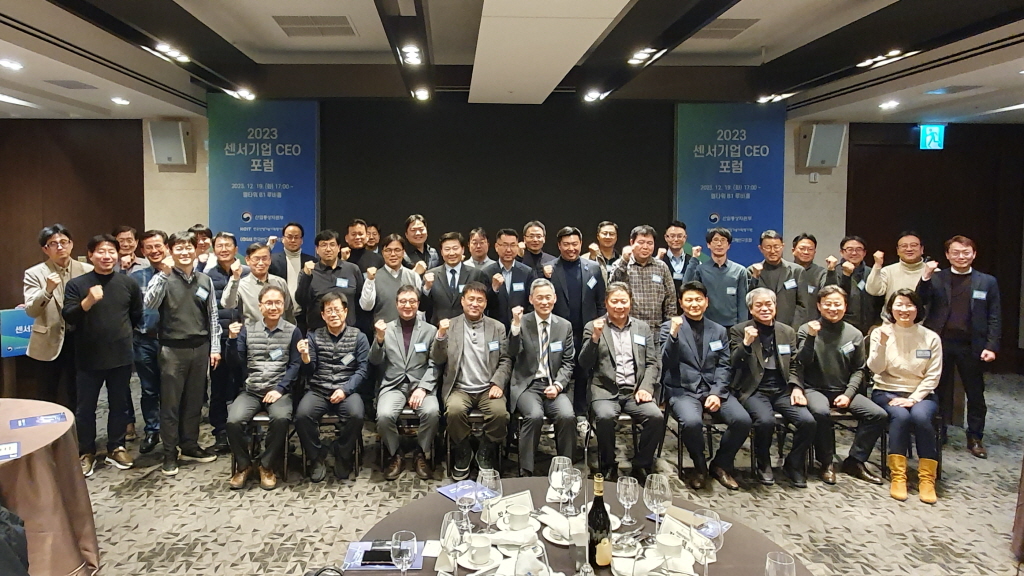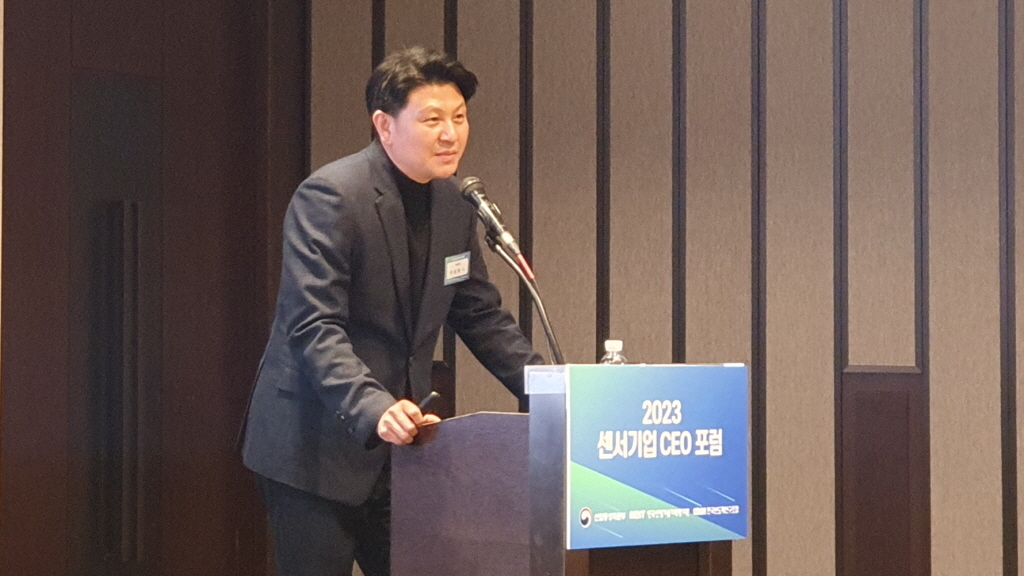한국반도체연구조합이 19일 엘타워에서 개최한 ‘2023 센서기업 CEO 포럼’에 따르면 미래 무기체계가 무인화, 지능화되면서 고성능 센서의 필요성이 점차 높아지고 있으며, 첨단 이차전지 분야에서도 생산 및 사용상의 안전을 위해서 센서의 중요성이 높아지고 있는 것으로 나타났다.

▲2023 센서기업 CEO 포럼 참석자들이 기념촬영을 하고 있다.
‘2023 센서기업 CEO 포럼’ 개최, 센서기업간 교류
미래 무기체계 무인화·지능화에 수요증가·성능중요
이차전지 충방전 열폭주 예방, 관련 산업 무궁무진
미래 무기체계가 무인화, 지능화되면서 고성능 센서의 필요성이 점차 높아지고 있으며, 첨단 이차전지 분야에서도 생산 및 사용상의 안전을 위해서 센서의 중요성이 높아지고 있는 것으로 나타났다.
한국반도체연구조합은 19일 엘타워에서 ‘2023 센서기업 CEO 포럼’을 개최했다.
이번 행사는 국내 센서기업간 교류 확대 및 정보교환을 위해 개최됐다.
주제발표로는 어성필 현대로템 실장이 ‘미래전장환경 변화와 기동무기체계 개발’에 대해 발표했고, 김영세 한국하니웰 상무가 ‘How to Prevent Thermal Runaway in High Volume LIB Cell’을 주제로 발표했다.

▲어성필 현대로템 실장이 ‘미래전장환경 변화와 기동무기체계 개발’에 대해 발표하고 있다.
어성필 현대로템 실장은 현대 군사작전 환경이 물리, 공간에서 사이버, 네트워크 환경으로 변화하고 있고, 무인전투 환경 및 드론 등의 등장으로 대전차 위협 환경이 변화하고 있다며, 미래 무기체계는 소프트웨어 중심 무기체계로 발전하고, 무인화, 지능화가 가속되며 센서의 수요가 증가하고 있다고 밝혔다.
군사적으로 광학센서, 등화관제등, 상황인식 서라운드뷰, 열상/주간 카메라, 라이다, 레이더 등의 센서들이 군사용으로 많은 수요가 있다고 전했다.
특히 국방에 적용되는 센서는 내 환경성이나 성능이 보장될 수 있는 것이 관건으로 국방을 목표로 센서를 납품하거나 개발한다고 하면 이런 측면을 먼저 고려해야 한다고 조언했다.
이와 함께 다목적 무인 차량 사업, 복합 고등 다족형 로봇 등에 대해서도 발표하며, 국방 관련 장비의 안정적인 개발을 위해서는 센서 공급이 중요하다고 밝혔다.
.jpg)
▲김영세 한국하니웰 상무가 ‘How to Prevent Thermal Runaway in High Volume LIB Cell’을 주제로 발표하고 있다.
이어진 주제발표에서 김영세 한국하니웰 상무는 이차전지의 경우 3,000번을 충방전해도 새 제품의 80% 수준의 성능을 갖춰야 하는데, 성능은 둘째치더라도 화재 등의 문제가 발생하는 경우가 많다고 전했다.
특히 이차전지는 열폭주 현상 등으로 인해 사람이 감지하는 순간 이미 화재가 발생해 막을 수 없을 경우가 대부분이기 때문에 화재 방지를 위해서는 센서를 통해 미리 화재를 차단할 수밖에 없다고 밝혔다.
화재 방지를 위해 하니웰은 Li-ion Tamer를 통해 이차전지에서 발생하는 오프가스(off gas) 감지시 전원을 즉각 차단한다고 언급했다.
하니웰의 Li-ion Tamer는 모니터링 센서 12개와 레퍼런스 센서 3개가 1세트로 구성됐으며, Off Gas 감지시 10초 이내에 알람 및 전기 차단이 이뤄진다고 밝혔다.
특히 어떤 가스를 감지하냐가 중요한데, CO, H2, CO2, CH4 등의 가스는 열 폭주시 검출되는 가스로 이들 가스가 발생하기 전에 DEC, DMC를 먼저 감지해야 한다고 말했다. 이를 위해 복합 가스를 감지할 수 있는 센서가 필요하다고 밝혔다.
이런 센서들은 이차전지 생산 라인에서부터, 전기차 충전소 및 충전기, 이차전지 충·방전 테스트 시설 등에서 사용되고 있으며, 적용될 수 있는 산업 분야는 많다고 언급했다.
주제 발표에 이어 카네비모빌리티에서 라이다센서 개발과 협력 수요를 주제로 참여기업소개가 진행됐다.
이번 행사에서 인사말을 한 김정회 반도체산업협회 부회장은 “다른 반도체 사업이 성공하는 것처럼 센서 반도체 사업이 성공할 수 있도록 기술개발에 대한 정책적 제안을 하겠다”고 말했다.
또한 주병권 한국주도형 K-sensor 기술개발사업 단장은 “국내 센서 산업에 대한 희망을 가지고 기술 개발에 전진하자”고 언급했다.


.jpg)